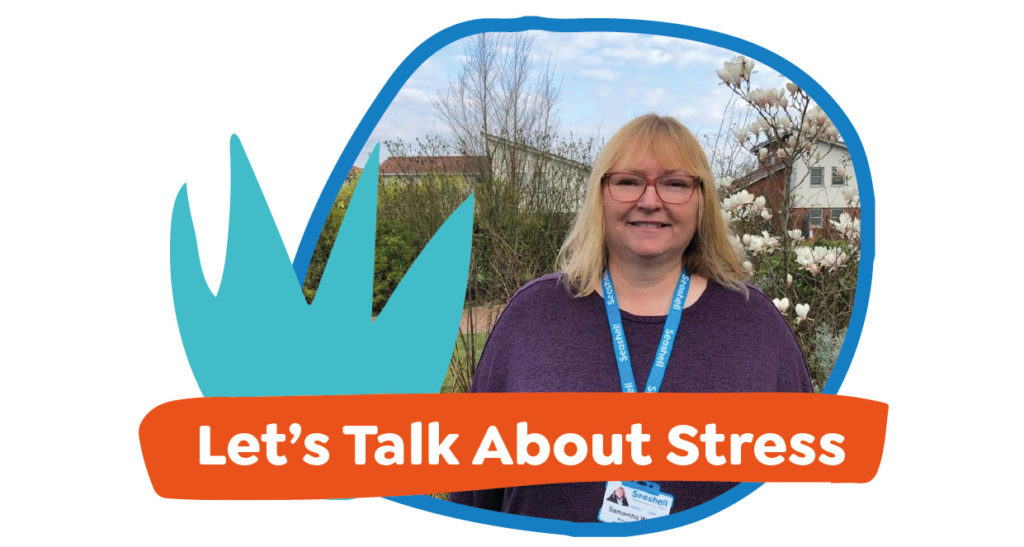
For Stress Awareness Month, we asked our newly appointed Mental Health Nurse, Sam Wong to share some key facts about stress, to help us better understand the impact it can have on our lives and bodies. Sam also shares some top tips on how to cope with stressful situations and how there is always help available, should you feel you need it.
So…What is Stress?
Put simply, stress is mental or emotional pressure.
It is quite normal to experience stress, and our bodies are made to cope with the daily demands of stress. Without certain degrees of stress we would find it difficult to get out of bed early in the morning and get to work! We would struggle to hit deadlines, or even move out of danger. Stress can help us to motivate ourselves and those around us.
So why does ‘stress’ have such a bad name? Because too much stress is not good for our mental, emotional and physical health. When we are stressed our bodies release hormones, and these hormones caused by excess stress can leave us feeling overwhelmed or even unable to cope.
What Causes Stress?
There are two types of stress, short term and long term.
Short term stress comes in bursts. It might be that alarm clock in the morning, it could be on the way to work you have to slam your brakes on suddenly, or someone around you could suddenly act in an unpredictable way. On the other hand it could be a positive stress, like doing something new or exciting.
Long term stress occurs when stress continues for longer than we had hoped. For example a short term stress of an unexpected bill turns into long term money problems. We may have negative relationships that continue for a period of time. We may experience stress at work when supporting individuals that challenge our skills, experience and knowledge.
Working with children and young people with complex needs is extremely rewarding, but it also has its challenges. If we face too many challenges every day, it can be overwhelming. In some cases the build up of these short of short term stresses can develop to become long term issues.
What Are The Effects of Stress?
Short term stress and positive stress can enhance our lives and be good for us, however long term stress can wreak havoc on our bodies both mentally and physically.
When we are put on alert and release stress hormones over a period of time, our bodies begin to react. Physically, we may get headaches, our blood pressure may begin to rise, and skin problems like eczema could flare up. It could have an impact other hormones, making periods irregular. Weight changes can occur due to comfort eating or a loss of appetite, and our bowel habits may change. We may get aches and pains in our joints, particularly neck issues, and we could struggle with energy levels and feel tired all the time. Long term health problems such as Diabetes and Heart Disease could develop.
If not addressed appropriately, long term stress can turn into ongoing anxiety and depression. It is important to remember, help is always available should you need it.
How to Cope With Stress
Everyone copes with stress differently – we are all unique and it’s important to find things that suit us personally. Here are 5 top tips that you may wish to try.
Self Care
From yoga, to running, to having a nice warm bubble bath – find a selfcare activity that works for you. Try and get all the sunshine you can, eat right and try to get enough sleep. try to avoid negative activities such as drinking too much alcohol or using illegal drugs, as they can make a bad situation even worse.
Worry Time
If your day starts and ends with worries or anxieties why not introduce ‘worry time’. At a specific time in the day, designate some time to concentrate on something that is worrying you. This can help you address the worry, allowing you to get on with the rest of your day.
The Joy of ‘No’
Learn to say ‘no’, if you are unable to take part in something, or if you feel an activity will have a negative impact on your wellbeing.
Focus on the Controllable
Accept that there are some things that you cannot control, so try not to waste time worrying about things you cannot change. If you are stressed about something, work out if there is anything you can do to make things better and plan how you will achieve this.
Seek Help and Advice
Get connected with people who you can speak to and share your experiences with. Don’t be afraid to seek emotional support – this could be from a family member, a close friend, a colleague, or your doctor. There are also medications that can help support you in the short term and long term, if you feel that may help.

